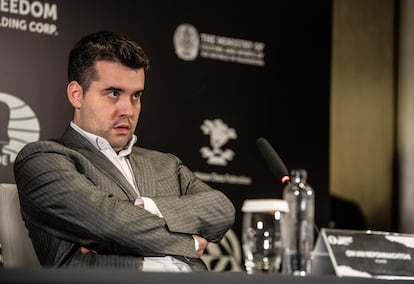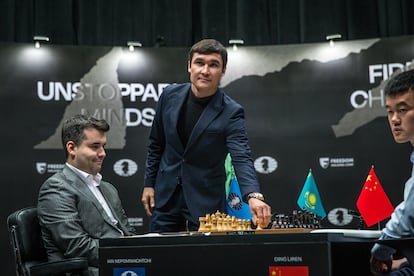Ian Nepomniachtchi: A meticulous Russian who opposes the invasion of Ukraine
Those around the second-best chess player in the world believe that the current champion, Magnus Carlsen, advised his rival, Ding Liren, before the World Championship


Today, a normal Russian citizen could go to jail for saying what chess player Ian Nepomniachtchi told EL PAÍS on April 8: that he is against the invasion of Ukraine and that, to him, that war is “horrific.” Such courage contrasts with another of his most solid principles: in a duel for the World Championship, such as the one he is contesting against China’s Ding Liren in Astana, Kazakhstan, no detail is too small. Everything matters. Like having his own Russian cook, even if he is staying in a luxury hotel. Last Sunday, April 16, Nepomniachtchi, ranked second in the world, lost the sixth game against the Chinese world number three and he will lead the white pieces next Tuesday in the seventh of 14 games, with the score level at 3-3.
Three sources familiar with the Russian upper echelons and who requested anonymity gave consistent statements in separate conversations with this newspaper. When, a few days after the start of the invasion, 44 Russian chess personalities (Nepomniachtchi among them) signed a manifesto against it and in solidarity with Ukraine, the law did not allow for the imprisonment of a person for doing this. Nevertheless, several signatories immediately migrated to various countries. But the world runner-up — defeated in Dubai by the Norwegian Magnus Carlsen in 2021 — decided to stay. The three sources mentioned that the millionaire Andrey Filatov, president of the Russian Chess Federation and very well connected to the politicians closest to Vladimir Putin, interceded for Nepomniachtchi and other signatories who continue to live in Russia.
However, with the current, reformed law, “Nepo is at least on the edge of the red line, but more on the illegal side” for what he said during the interview, they point out. They also agree on one detail: “Being a very famous person protects him. And if he becomes world champion, he will be even more protected. But you never know.” Both his coach for many years, Vladimir Potkin, who spoke via videoconference from Russia, and his friend and former agent, Sergei Yanovsky, who responded to questions by email, refused to say if anything related to the war has interfered with Nepomniachtchi’s preparation for the World Championship in Astana or affected him in any way.

Two people from the World Championship organization revealed — also under condition of anonymity — that the Russian player had been extremely meticulous in his demands surrounding the conditions of the match: “To really annoying extremes,” added one of them. For Yanovsky, there is a logical explanation: “Ian learned a lot playing against Carlsen in the Dubai World Championship. For example, that no matter is too small; every detail that can affect, for example, his health or mood, can be very important. He was not satisfied with what he was offered in Astana in terms of food, so he brought his own cook, who knows his tastes very well.”
Nepomniachtchi himself admits that he used the wrong strategy against Carlsen in Dubai, and in this contest he wants to play to his strengths again. Potkin clarifies: “Yes, we are seeing a more creative Ian than in Dubai. But it is also true that he is now a more complete player, with a more universal style, as he proved especially in the Madrid Candidates Tournament. And all of that is the fruit of the hard work we did for Dubai, which paid off afterwards.”
At that point in the conversation, Potkin diverts towards the creativity that Ding has been displaying, most likely as a result of hiring Romanian Richard Rapport (ranked 13th) as an analyst. His own explanation, though, is surprising: “I think Carlsen spoke to Ding before the World Championship and gave him several pieces of advice. Among them, that he take just one analyst to Astana and communicate with the others by electronic means. And that this analyst was someone very creative. As it would have been excessive for him to lend him the most creative of his, [Russian Daniil] Dubov, he suggested Rapport.” Carlsen’s father, Henrik, has not responded to a request to confirm or deny this assumption; the general secretary of the Chinese Federation, Tian Hongwei, replied, “I know absolutely nothing about this.”
There is a certain, convoluted logic to Potkin’s claim. Carlsen is motivated by big challenges, and he has stated that he renounced the title because he fears losing to opponents that he considers “clearly inferior,” like Nepomniachtchi. In 2019, he said that Ding was the most fearsome opponent for him at the time. If the Chinese defeats the Russian in Astana, the Norwegian would have a compelling reason to play the Candidates Tournament in Toronto, Canada, next year, and challenge Ding at the end of 2024.
Sign up for our weekly newsletter to get more English-language news coverage from EL PAÍS USA Edition
Tu suscripción se está usando en otro dispositivo
¿Quieres añadir otro usuario a tu suscripción?
Si continúas leyendo en este dispositivo, no se podrá leer en el otro.
FlechaTu suscripción se está usando en otro dispositivo y solo puedes acceder a EL PAÍS desde un dispositivo a la vez.
Si quieres compartir tu cuenta, cambia tu suscripción a la modalidad Premium, así podrás añadir otro usuario. Cada uno accederá con su propia cuenta de email, lo que os permitirá personalizar vuestra experiencia en EL PAÍS.
¿Tienes una suscripción de empresa? Accede aquí para contratar más cuentas.
En el caso de no saber quién está usando tu cuenta, te recomendamos cambiar tu contraseña aquí.
Si decides continuar compartiendo tu cuenta, este mensaje se mostrará en tu dispositivo y en el de la otra persona que está usando tu cuenta de forma indefinida, afectando a tu experiencia de lectura. Puedes consultar aquí los términos y condiciones de la suscripción digital.








































